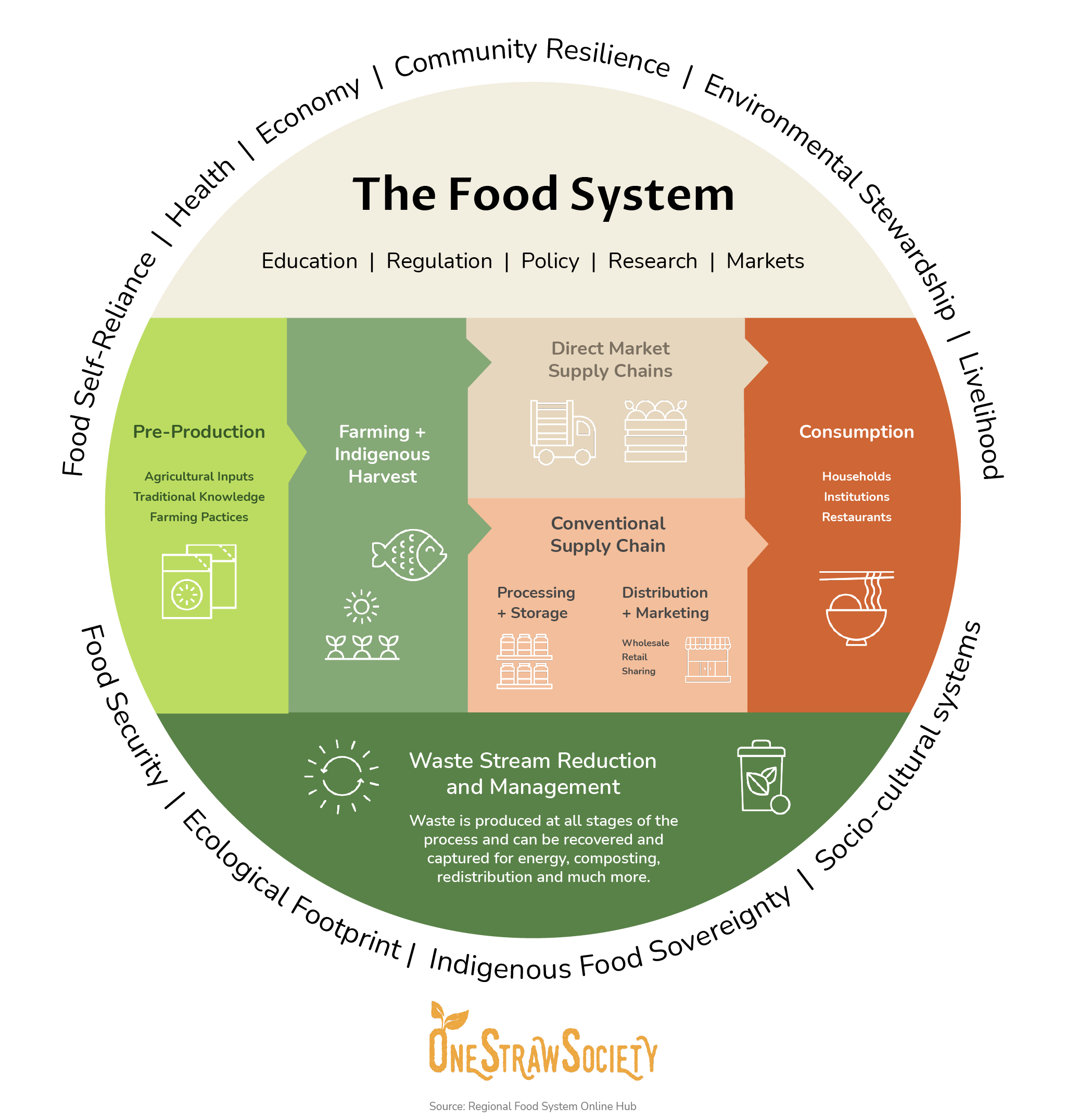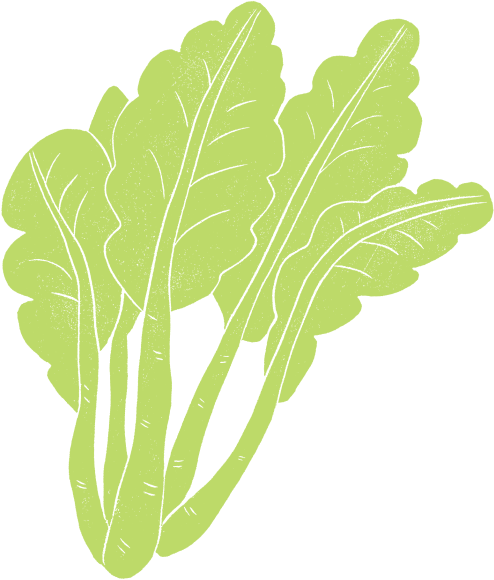About our food system
An introduction to the issues we work on

What is the Food System?
The food system includes all the chapters in the story of getting food from farm to belly. It includes growing and production, marketing, processing, distribution, consumption, and the inputs needed and outputs generated at each of these steps. But it doesn’t stop there.
The food system is the delicate web of governance, laws, economics, systems, organizations, processes and infrastructure involved in feeding a population overall. It’s food banks, farm markets, dieticians, mechanized equipment, factories, fishing boats, soil labs, compost, and everything in between. It’s the systems that “feed” this web – water, energy, finance, marketing, policy, and culinary systems.
A bird’s eye view reveals the vast capital, systems, and focus we put on food… and for good reason, obviously.
What is Food Security?

Food security means that all people, at all times, have physical, social, and economic access to sufficient, safe, and nutritious food that meets our food preferences and dietary needs for an active and healthy life.
The focus here is on access, affordability and availability. While some tend to think of food insecurity as stemming from an actual lack of food (i.e. famine), it’s typically an income issue. Buying food, or a certain nutritional quality of food, is de-prioritized when other ‘non-elastic expenses’ (rent, gas, utilities, even food costs) keep rising and people are unable to keep up.
Food insecurity here on the Sunshine Coast can be addressed at the root, through income based solutions and stronger social safety nets, rent supports and wage increases.
What is Food Resilience?

A resilient food system is able to withstand and recover from crisis and disruptions in a way that ensures a sufficient supply of acceptable and accessible food for all.
We tend to think of resilience in terms of ecological systems like crops withstanding the impacts of climate change – floods, drought, wind and cold. But a food system’s resilience – especially the conventional, global industrial agriculture system – can be disrupted by many influences beyond environmental factors.
The COVID-19 pandemic, price shocks, global market changes, supply chain interruptions and rising income inequality have all shown us that resilience needs to be a priority in food systems at all levels and in all regions, even in the affluent regions of Western Canada.
Why does it matter?
“Food Security” is the term people most often use, but it really only focuses on access, affordability and availability. While useful, it doesn’t focus on the whole food system, how resilient we are in times of uncertainty, nor how cheap and convenient food impacts our planet, societies, our health, and our future.
On the Sunshine Coast, we’re focused more on food resilience than food security. Abundant local food production, localized supply chains, skills and knowledge in food production, preparation and preservation, local purchasing where possible, and ensuring household food security for all members of our community are all practical pieces in our work to nurture a more robust and resilient food system.

Beyond secure and resilient: What does a socially just food system look like?
A food system that is socially just needs to be working, even in small ways, towards addressing the root causes of food system inequalities and structural barriers to control, access, availability and participation. The Food Justice and Food Sovereignty movements both represent efforts towards more radical food system transformation.
Food justice is a holistic and structural view of the food system that sees healthy food as a human right and addresses structural barriers to that right (issues of race, class, gender). True and lasting “Food security” cannot be achieved without getting to the root of the reasons that access, affordability and availability are consistently restricted for certain groups. The Food justice movement fights to eliminate these barriers through advocacy, policy change, and the introduction of access points that battle and attempt to upend structural issues. This work cannot be done without education, solidarity, advocacy at many levels and acknowledging and sharing the lived experiences and voices of those whom are impacted by the structural issues; and most importantly, including them directly in designing strategic processes, projects and priorities
Food sovereignty is the right of peoples to healthy and culturally appropriate food produced through ecologically sound and sustainable methods. More importantly, it is the right to define and control our own food and agriculture systems, including markets, production modes, food cultures, and environments.
This is the most radical of the terms we use when we speak about doing work on, or transforming the food system since it demands large scale structural change to production methods, supply chains, consolidation and concentration, economics and even consumption patterns. Food Sovereignty is a bottom up, community driven approach to extreme food system transformation which gives full rights, decisions and control first and foremost to producers and communities themselves. For example, while food security could theoretically be met through corporate means (i.e. in the provision of more calories or lower prices) food sovereignty advocates for less, or no corporate control. Food sovereignty champions small producers and their access to land, seeds, markets and a healthy environment to produce what they choose and move that food as they see fit. Subsidies that favour large scale, environmentally degrading production need to end and investment and support needs to be directed towards small scale, agro-ecological farmers and more regionalized supply chains. And this type of radical food system transformation will shake consumers from our long held patterns and expectations. We need to be prepared for big changes in the food system.
Our work on these issues
Education
We believe that communities are stronger and more resilient when we share skills and knowledge between generations and cultures.
Research & Policy
We also approach the topic from a knowledge seeking angle by involving local experts and authorities in developing research and policy.
Programs
To help our region on this important work, we run dozens of events, projects, programs, and learning opportunities for the community.

